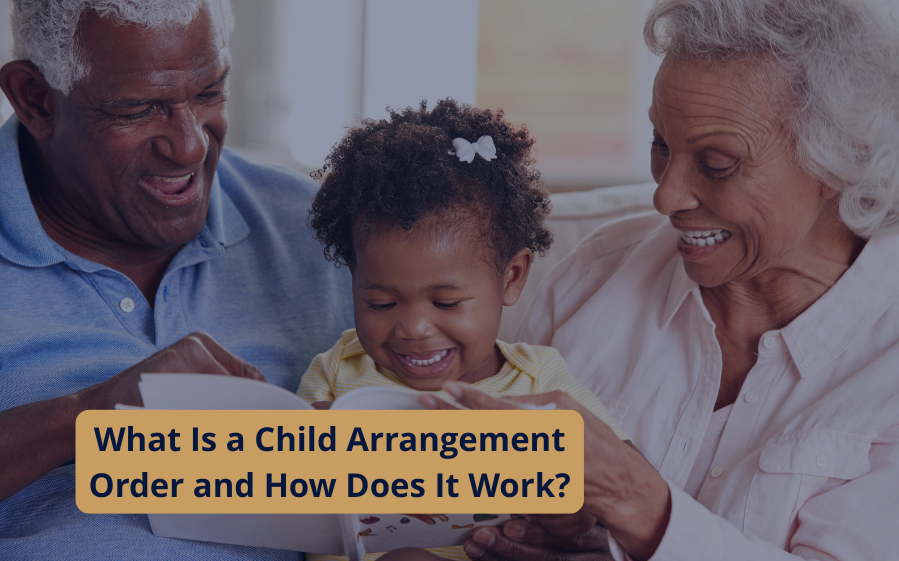
When parents separate or disputes arise over a child’s living arrangements, it can be difficult to know where to turn. In England and Wales, if informal agreements break down, the court may step in by issuing a Child Arrangement Order.
This article explains what a Child Arrangement Order is, who can apply for one, when the court becomes involved, and how decisions are made in the best interests of the child.
What Is a Child Arrangement Order?
A Child Arrangement Order is a legally binding court order that sets out where a child should live and who they should spend time with. It replaces the older terms of residence orders and contact orders, and is now the main legal framework used to resolve child custody disputes in family law.
A Child Arrangement Order can specify:
- Who the child lives with
- Who the child spends time with or has contact with
- The schedule for contact (e.g. weekends, holidays, midweek visits)
- Whether contact is direct (face-to-face) or indirect (e.g. via phone, video call, or letters)
It provides structure, stability, and clarity, especially important when parents are struggling to agree privately.
Who Can Apply for a Child Arrangement Order?
The following people can apply automatically for a Child Arrangement Order:
- A child’s mother or father
- Anyone with parental responsibility
- A step-parent or guardian
- Someone who already has a residence or live-with order for the child
Other individuals, such as grandparents, aunts or uncles, or close family friends, can also apply, but they will first need to seek the court’s permission. This is known as applying for “leave” of the court. The court will consider the applicant’s relationship to the child and whether the application is in the child’s best interest.
When Does the Court Get Involved?
The court is usually treated as a last resort. Before applying, most parents are expected to attempt mediation, a process where an independent mediator helps them try to reach an agreement.
However, the court will get involved when:
- Parents cannot agree on where the child should live or how contact should be structured
- There are concerns about the child’s welfare or safety
- One parent is denying access to the child
- There is domestic abuse, neglect, or substance misuse involved
If no agreement is reached through mediation or safety concerns are raised, an application can be made to the Family Court, and the judge will make a legally binding decision via a Child Arrangement Order.
What Does the Court Consider When Making a Child Arrangement Order?
The court’s primary focus is the child’s welfare. Judges do not favour one parent over another and will make decisions based on what is best for the child, not the adults involved.
To guide this decision, the court uses the Welfare Checklist from Section 1 of the Children Act 1989. This includes:
- The child’s wishes and feelings (considered in light of their age and understanding)
- The child’s physical, emotional, and educational needs
- The likely effect of any change in circumstances
- The child’s age, sex, background, and any relevant characteristics
- Any risk of harm
- The ability of each parent (or carer) to meet the child’s needs
- The range of orders available to the court
The court may also consider recommendations from Cafcass (Children and Family Court Advisory and Support Service), who may speak with both parents and the child to help inform the decision.
What Happens If the Order Is Breached?
A Child Arrangement Order is legally enforceable. If one party breaches it, for example, by not returning the child after contact or refusing access, the other party can return to court to request enforcement.
The court has several powers to deal with breaches, including:
- Warnings or fines
- Community service requirements
- In rare cases, even imprisonment for repeated and serious breaches
That said, the court will always consider both sides before taking enforcement action. They may ask why the breach occurred and whether there were legitimate concerns, such as safety or illness, that caused it.
Do You Need a Solicitor to Apply?
While it’s possible to apply for a Child Arrangement Order yourself, many parents choose to work with a child custody solicitor to guide them through the process.
A solicitor can help you:
- Understand your legal rights
- Prepare your application and evidence
- Represent you in court
- Negotiate with the other parent
- Put forward your views clearly and constructively
Legal advice can be especially important in complex cases involving safeguarding concerns or when extended family members (such as grandparents) are applying.
Final Thoughts: Taking the Next Step
When families are in conflict over where a child should live or how much time they should spend with each parent, a Child Arrangement Order can bring clarity, routine, and reassurance.
At Berkson Family Law, our experienced child custody solicitors help parents and carers understand their rights and secure arrangements that reflect the child’s best interests. Whether you’re struggling to reach agreement or facing a court application, we’re here to support you every step of the way.
You can book a free, confidential consultation with one of our family law experts today, or email us at info@berksonfamilylaw.co.uk for further guidance.

